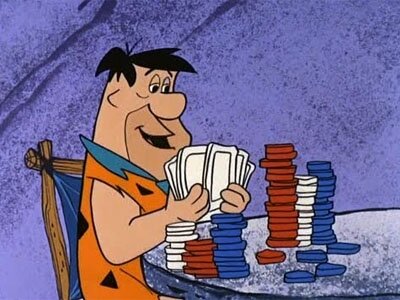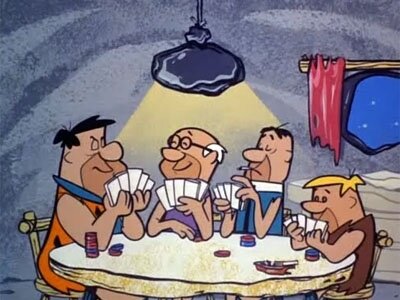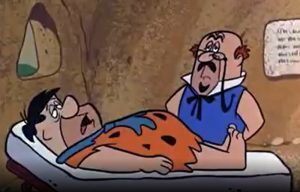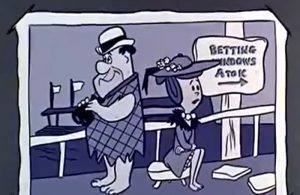Did Fred Flintstone have a gambling problem? If you look back at several episodes from the classic 60’s cartoon show, a good case could be made that Fred Flintstone exhibits signs of what the American Psychiatric Association describes as “gambling disorder”.
According to the APA‘s latest diagnostic manual, the DSM-V in 2012, there are 9 diagnostic criteria for determining gambling disorder. Today, we’ll compare several famous episodes of The Flintstones with the DSM-V and diagnose Fred Flintstone’s problem behavior.
Therapists and psychiatric researchers warn against diagnosing people from afar. It’s considered unethical by some therapists to diagnose public figures. We think we’re on safe ground diagnosing a cartoon character. Also, it might seem flippant to diagnose a fictional person. That being said, Fred Flintstone is a famous character and he exhibits several traits of a problem gambler.
By focusing on Mr. Flintstone’s gambling activities, we can point out dangerous behaviors and use him as an instructional tool for real people.
Fred Flintstone: A Quick Personality Profile
Football. Golf. Bowling. Frederick J. Flintstone is a bona fide three-sport star. The main character of the animated sitcom The Flintstones, which aired during prime-time on ABC from 1960 to 1966, has a long list of exploits. Not only one of the most recognizable figures in show business history, he also played college football under the call sign ‘Twinkletoes’. He once won his city golf championship and is the best bowler the town of Bedrock has ever seen. Ole’ Freddie boy is a man of many talents.
Gambling, though, isn’t one of them. In fact, the sheer mention of the word ‘bet’ causes him to stutter and stammer uncontrollably. Despite all his competitive success, Fred Flintstone exhibits signs of problem gambling. Like other famous athletes who love the adrenaline rush of competition (Michael Jordan, Charles Barkley), Fred sometimes goes too far when he gambles.

With standout athletic qualities and an abundance of natural talent and skill, it’s hard to fathom Flintstone’s misfortune when it comes to wagering. You’d think gambling would be right up his alley but, in bowling parlance, he is rolling gutter balls. A selflessly devoted husband and father, Fred is also impulsive and ill-tempered at times. These traits leave him vulnerable to huge gambling losses, sad schemes to recoup the losses, and tilt. Fred is not exactly fit for high-stakes action. Even worse, it affects his home life.
“Wilma! Oh, Wilma,” he once bellowed, as he excitedly raced through the front door with a pocket full of money. “I’m glad you’re still up, honey. Guess what happened on my way home?”
The Flintstones Cartoon: A Lesson in Gambling Responsibly
The truth is, Fred had been out playing poker with his best friend Barney Rubble. They just couldn’t pass up the lucrative home game at Sam Quartz’s house with the likes of Stanley Stonebruise, who is widely considered one of the weaker players in town. Stonebruise was the so-called ‘fish’ with deep pockets. Flintstone was right to go because he had a good night, winning about 200 ‘clams’.
The problem? He had lied to his wife Wilma earlier in the evening about being “too tired” to see a movie at the Bedrock Cinema, and didn’t want his wife to know how he came about the winnings. Instead of being truthful, he pretends to have found the money in a lost wallet. As you might expect with cartoons, one lie leads to another, and wild escapades ensue.

When Wilma, who knew all along about the poker, finally demands the truth, Flintstone fibs yet again by suggesting the loot belonged to Barney. The episode is called The Little White Lie (season 2, Episode 9), originally aired in 1961, and depicted a series of little white lies throughout, but also painted a vivid picture of the grimness of gambling addiction.
When you start lying about something, whether it’s alcohol, drugs, or even sex, chances are you have a problem. Remember, addiction doesn’t discriminate. It can affect all kinds of people, in all walks of life, even Fred Flintstone.
Criterion G: “Lies to Conceal the Extent of Involvement with Gambling”
In The Little White Lie, Fred lies to Wilma to cover up his gambling activities. Fred thus “lies to conceal the extent of involvement with gambling,” satisfying Criterion G.
By the way, Barney gleefully used his newfound clams to treat his wife Betty and the Flintstones to an expensive dinner, and Fred’s frustration is painfully evident. What are friends for, right?
Fred Flintstone’s Wagering Woes
Another sure sign of addiction? Fred’s childhood nickname was ‘Betting Freddie’. Yes, it started early for our adorable leading man. According to the website flintstones.fandom.com, whenever the word ‘bet’ is mentioned, Fred hears bells and whistles and will “quiver and roll his eyes and repeat the word over and over like a clucking chicken.”
Not long after The Little White Lie, Flintstone is once again in a spot of bother following some shenanigans in The Gambler (Season 2, Episode 16). In an effort to deal with his addiction, and on Wilma’s order, Fred visits a psychiatrist, who urges him to muster the willpower required to quit betting. That proposed remedy doesn’t square with 21st-century treatment methods, but it brings to mind another diagnostic criterion.
Criterion C: “Has made repeated unsuccessful efforts to control, cut back, or stop gambling.”
After Fred visits the therapist, he tries to give up gambling, but cannot give up the habit. Since this seems like a pattern of behavior, we can check off Criterion C: “Has made repeated unsuccessful efforts to control, cut back, or stop gambling.”
In fact, The Little White Lie checks off two of the diagnostic criteria.
Criterion H: “Has jeopardized…a significant relationship…because of gambling.”
Not for the first time in these examples, The Gambler also satisfies Criterion H: “Has jeopardized…a significant relationship…because of gambling.” Fred’s gambling causes his wife enough distress that she forces Fred to get therapy, so it’s obvious he’s jeopardized the relationship.

Double-or-Nothing Bets: Martingale Betting
Of course, Fred is not really cured of his vice, and viewers watch along in disbelief as he continues to make bad decisions. First, while attempting to cancel his newspaper subscription, he offers the newspaper boy Arnold “double-or-nothing” on a game of marbles for the $22.12 in fees owing. You guessed it; he loses. He bets double-or-nothing again and again, and each time he loses. And, he was making bets he couldn’t cover. Not wanting to welch, Fred hands over the family television set and living room furniture until he can pay off the debt.
Criterion F: “After losing money gambling, often returns another day to get even (‘chasing’ one’s losses).”
When he starts wagering with the newspaper boy over marbles, Fred goes back to his gambling activities. He loses a series of bets but each time chases his losses with a double-or-nothing bet. This satisfies Criterion F: “After losing money gambling, often returns another day to get even (‘chasing’ one’s losses).”
These wagers don’t take place over successive days, but the key factor is whether Fred chases his lost bankroll. He does. Not only does the marbles episode show the depth of Fred’s problem gambling, but it also is a good example of why you avoid the Martingale betting technique. After each lose, Fred doubles the bet. Soon enough, he’s lost all his cash.
Fred Flintstone Exhibits the Signs of Gambling Disorder
At this point, we can say Fred Flintsone exhibits gambling disorder, because we’ve marked off Criteria C, F, G, and H. Four behaviors qualify one for gambling disorder, so we should next determine how distressing the behavior is.
Criterion D: “Is often preoccupied with gambling.”
The situation with the newspaper boy also illustrates Fred’s preoccupation with gambling. To cut down on expenses, Fred tries to cancel his newspaper subscription. He can’t get through this simple act without betting against the newspaper boy over marbles. This satisfies Criterion D: “Is often preoccupied with gambling.”
Criterion I: “Relies On Others to Relieve Financial Situations”
Also, In The Gambler, Fred swindles his best friend, Barney, out of his tv set to pay for his gambling debts. In doing so, he satisfies Criterion I: “Relies on others to provide money to relieve desperate financial situations caused by gambling.”
Later, in an attempt to right his wrong, Fred falls further from grace when he accepts Barney’s proposal and swindles him out of the Rubble TV set, a betrayal so egregious it prompts his pal to say, as he’s delivering the television, “Fred Flintstone is no friend of mine.”
In one scene, after learning the truth, Betty says to Wilma incredulously, “a real gambler never goes back on his bets. They’ll skip house payments, the kids’ lunch money, but gambling debts are debts of honour.”
Viva Rock Vegas
Once he’s in Rock Vegas, Fred goes to the Rock Vegas casinos to gamble on stone age slot machines. He uses so many casino markers that he has to sell his car to pay off the debts. So, once again, Fred satisfies another diagnostic criterion for gambling disorder.
We’ve all heard the saying, “what happens in Rock Vegas, stays in Rock Vegas”, but in reality, Fred Flintstone should never step foot in such a place. Bad things are bound to happen. The Rock Vegas Story (Season 2, Episode 28) hit the airwaves in March 1962, and told the sad tale of a degenerate gambler, his penchant for slot machines, and the resulting misery.

Fred’s betting habits, and the subsequent sad state of affairs, are summed up nicely in one scene with this group conversation:
Wilma Flintstone: Have you made any plans, Fred?
Fred Flintstone: Yeah. I figure we can sell the car and then we’ll have enough money to eat.
Barney Rubble: While we’re hitchhiking home.
Wilma Flintstone, Betty Rubble: Hitchhiking home?
Wilma Flintstone: Fred Flintstone! Did you lose all our money?
Fred Flintstone: Yes, Wilma.
Wilma Flintstone, Betty Rubble: Oooooooh! MEN!
Selling the vehicle for food money? That’s addictive behaviour in a nutshell.
Diagnosis: Fred Flintstone Shows Signs of Moderate Gambling Disorder
Yes, Fred Flintstone is a problem gambler. The examples above satisfy 6 different diagnostic criteria. We can say Fred Flintstone exhibits moderate gambling disorder – he’s a problem gambler.
We can’t guess about the other three criteria. These have to do more with Fred Flintstone’s inner psychological or emotional world. One involves (1) gambling bigger amounts to achieve the same level of excitement, (2) being restless or irritable when attempting to cut down on gambling, and (3) gambling when feeling distressed.
Anyone who’s seen The Flintstones has seen Fred Flintstone be restless and irritable plenty of times, but it’s hard to say whether it’s from gambling or simply a general personality trait. Having analyzed the cases on hand, we’re safe in saying Fred Flintstone exhibits 6 of the 9 criteria.
Fred Flintstone thus exhibits moderate gambling disorder. It’s hard to say based on our information if he has severe gambling disorder, though it wouldn’t be surprising.
Family and Friends Show Support for a Problem Gambler
One positive is that Fred Flintstone recognizes the distress that gambling causes him. He begins to stammer and stutter when the word “bet” is mentioned. Though these efforts fail, Fred Flinstone does make an effort to control his gambling. He is willing to see a therapist and takes steps to stop gambling.
We can take one other positive from The Flintstones gambling episodes — his family support him through his troubles. Wilma tries to get him help. The Rubbles understandably criticize Fred for his shenanigans and don’t condone his behavior, but they remain his friends.

Fred Flintstone: The Early Warning Signs
The Flintstones is a good example of problem gambling in another way. The indications were always there that Fred had a problem. In The Flintstones very first year on the air, in front of a national prime time audience, Fred bet an entire week’s worth of wages on dinosaur-horses. In At the Races (Season 1, Episode 8), he and Barney concocted a failed scheme to win enough money to buy Boulder Dan’s Pool Hall.
At The Races is a sign that Barney Rubble might have a gambling disorder, too, though that’s a question for another day. We’ll focus on Fred for now.
So yes, Fred Flintstone is a problem gambler.
Again, if you or a family member exhibit any of Fred Flintstone’s behaviors, please seek help. When you’re playing at Canadian online casinos, remember to always gamble responsibly.
